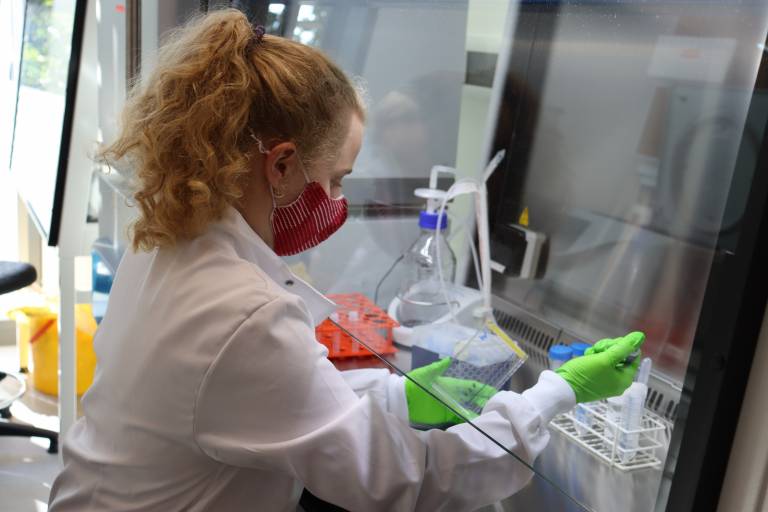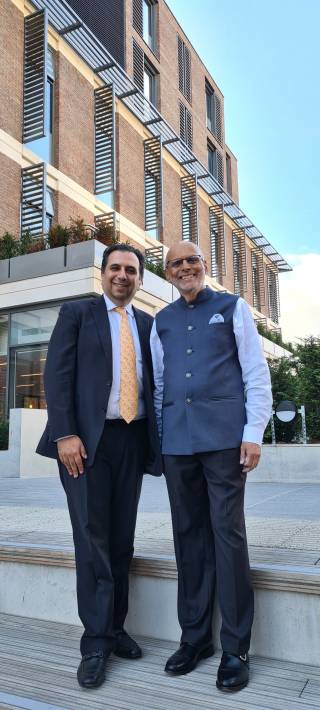New institute offers hope to patients with immune diseases
30 September 2021
A unique partnership of scientists investigating the human immune system – working alongside doctors, nurses and patients – will enable new treatments to be developed more quickly for global health problems, including COVID-19, type 1 diabetes and cancer.

Scientists have this week moved into the Pears Building which is a collaboration between the Royal Free Charity, UCL and the Royal Free London NHS Foundation Trust (RFL).
The building in the grounds of the Royal Free Hospital is home to the new UCL Institute of Immunity and Transplantation and unites the scientific excellence of a world-renowned university and the expertise of clinicians at the RFL. It increases the likelihood that patients with immune-related conditions will soon be able to access cutting edge therapies unavailable anywhere else.
The £60m institute will not only bring the theory and implementation of research much closer together but will also allow the public easy access to the latest discoveries in immunology research.
The building will accommodate up to 200 researchers who have been moving in over the past month. Patients taking part in research will be offered accommodation on the top floors of the building, many with stunning views across Hampstead Heath.
Professor Hans Stauss, Director of UCL Institute of Immunity and Transplantation, said: “The IIT is dedicated to the patient-focused research of the human immune system.
“The facilities in the new building will help us develop treatments to ‘turn up’ the immune system to respond to a threat from, say, a coronavirus, or to recognise cancer cells as a danger. We also explore ‘turning down’ the immune system in order to stop the rejection of transplanted organs and to treat autoimmune diseases such as type 1 diabetes, rheumatoid arthritis and multiple sclerosis.
“The final cluster of our research is around different inherited conditions, such as primary immunodeficiencies, in which faulty genes affect how the body’s immune system works.”
Professor Stauss said that the co-location of scientists and clinicians within the Pears Building meant that information discovered in the laboratory could be used to work with doctors, nurses and other healthcare professionals to refine and improve further research.
“The clinical trial facilities will help to accelerate the translation of scientific discoveries into new therapies for patients and I fully expect patients to be able to access cutting edge therapies not available elsewhere,” he added.

Pradip Patel, who lives in Southgate, north London, is hoping research being carried out at the IIT could transform outcomes for patients like him in the future.
In 2017, Pradip had a kidney transplant at the Royal Free Hospital – a childhood infection had scarred his kidneys so by his late 50s they had stopped working properly. The surgery went well but a couple of days later Pradip began experiencing severe stomach pains. Pradip’s immune system saw the new kidney as a ‘foreign object’ and had started attacking it. This is known as graft rejection and is a recognised risk to patients following a transplant operation.
Pradip had to undergo two further operations in the space of a few days and was given powerful drugs to suppress his immune system, as well as dialysis to ensure waste products would continue to be removed from his bloodstream until the new kidney started working properly. After recovering his health, Pradip was determined to help the doctors who had transformed his life and organised a charity golf event which raised £16,000 which was donated to the institute.
Reza Motallebzadeh is one of the IIT researchers looking for ways to prevent graft rejection in transplant patients. His work focuses on microorganisms in the gut, known as the microbiome, which is linked to the behaviour of the immune system.
He said: “We know that the gut microbiome plays an important role in regulating the immune system, but we want to understand more about what it does in relation to influencing the immune response to a kidney transplant. Our aim is to discover whether we might be able to alter the microbiome to decrease the chance of graft rejection.
“With the IIT next door to the Royal Free Hospital, it means researchers and clinicians can work closely together and with patients to ensure our research can lead to new treatments more quickly and can reap the greatest benefits to patients.”
Pradip added: “After having three operations in a short period of time, it took me months to recover. After recovering my health I was determined to help in some way. If we can stop graft rejection happening to other patients that would be a really positive step forward.”
Caroline Clarke, Royal Free London group chief executive, highlighted the benefits to patients of the IIT’s new home. “Our expansion of the institute will give many more of our patients the opportunity to take part in groundbreaking research.
“As well as providing more space for scientists to develop better treatments for cancer, diabetes, HIV and tuberculosis, and to support transplantation, the new centre will play its part in crucial research into COVID-19, helping the international effort to tackle this devastating virus. This important work will not only contribute to the health and wellbeing of our local community but will also be a world-leading centre for understanding the human immune system.”
The building also has offices for the Royal Free Charity and a 71-space car park for patients and visitors. It has been designed to complement the local area, with set-back terraces on the upper levels which allow light into the spaces behind the building.
Jon Spiers, chief executive of the Royal Free Charity, said: “The huge generosity of our donors, particularly the Pears Foundation, is what has made this unique collaboration possible and we are deeply grateful to them for helping us to bring so much hope to patients here and across the world.”
Links
- UCL Institute of Immunity and Transplantation
- Royal Free Charity
- Royal Free London NHS Foundation Trust
 Close
Close

